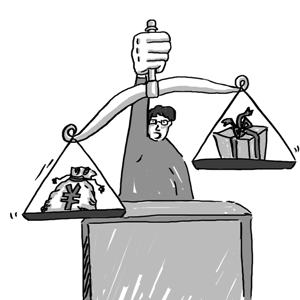Holidays must not be occasions for bribery

Illustration: Chen Xia/GT
On Tuesday, China celebrated its 29th Teachers' Day with students across the country presenting flowers and gift cards to their teachers.
My colleague Xu was unhappy when we talked about the issue the following day. His 3-year-old daughter just began her first semester at kindergarten. Xu prepared several roses for two class teachers, a trainee teacher and the ayi who helps take care of the kids.
The little Xu told her father that only the trainee and the ayi were happy and thanked her for her gift, while the two teachers were emotionless when they received the flowers.
Xu began to question his decision. He concluded that he was too naïve. He assumed that if he gave teachers a prepaid gift card, they might think it humiliating. Also, he didn't want his daughter to be polluted by the "unhealthy tendencies and evil influences" of society. But now he has changed his mind and is thinking of remedial measures.
In China, teachers are described as "engineers of the soul" or candles that sacrifice themselves to give light to others. When Xu was at school 30 years ago, it was very rare for students to give any gift to teachers, let alone cash. But now we find parents trying their best to please their kids' teachers by satisfying their ever growing "appetites." Parents all believe that if they are the only ones who don't give a gift, their child will be isolated and treated unfairly by the teachers. No family is willing to take the risk.
There are still many honorable teachers who are happy to contribute to society without claiming these perks in return. But we have to admit that the general environment is not conducive to cultivating a pool of incorruptible educators. And education is just one of the fields that is contaminated.
China will celebrate Mid-Autumn Festival next Thursday. Every year, bribes are taken and given in the form of mooncakes. In fact, the sweet and fatty seasonal treats are often left uneaten because of health concerns.
Nonetheless companies will compile a long gift list. Recipients will be classified as VIPs or common clients depending on their importance to the company's business. These "clients" can also include the civil servants who are tasked with supervising them.
The public has dubbed these traditional festivals "occasions for bribery." Without an effective system of oversight or penalty mechanism, the greed and appetite of the "right holders" increase beyond our imagination. They take advantage of their professional duties as a special right to profit.
It's shocking to hear officials admitting to taking bribes of millions in cash, real estate and jewelry. But only when they are caught and put on trial can the public know the extent of their wrongdoing. At the same time, people have the right to wonder about those who have not yet been caught. Anti-corruption campaigns have to target all the flies and tigers.
Luckily, things have begun to change since the new leadership started to promote a nationwide campaign of frugality among government departments at the end of last year. Any form of extravagance and waste is strictly banned. We have discovered from companies' half-year reports that the anti-corruption campaign has shrunk the profits of expensive liquor manufacturers and high-end restaurants.
Both the government and the public are happy to see these changes. The question is how long will it last? Is it just a short-lived show or a persistent battle? It's terrible that even teachers expect gifts. Teachers spend much more time with children than parents do. Students are often greatly influenced by their teachers. And schools are a microcosm of society where the young generation first learns how the world works. But we can't blame teachers too much given the wider context of our society.
When civil servants demand something extra for simply doing their jobs, why wouldn't teachers follow the same practice? If prevailing social mores are corrupt, we can't just be strict to a specific profession or individual. And this time, the campaign has started from the very highest levels of the central government, demonstrating the determination of the new leadership to tackle this problem. We have reason and confidence to wait for a good ending.
My brother, a Party member and a low-level official in my hometown, told me that this year he has been summoned to many conferences about the "anti-mooncake" campaign. His department is not allowed to buy mooncakes with public funds and as an official, he is not allowed to accept a gift of mooncakes. If anyone is caught in violation of these orders, severe punishment awaits.
Personally, I believe that flowers, greeting cards and mooncakes still have grounds for existence.
Mid-Autumn Festival is still a good opportunity for family members to get together and celebrate the holiday. When we pay a visit to our relatives and friends, it's still necessary for us to bring a box of mooncakes. But mooncake producers should learn from the fates of other industries that once flourished thanks to extensive bribery. They need to recalculate the real market scale and make strategic adjustments if they want to survive.
The author is the managing editor of Global Times Metro Shanghai. fengyu@globaltimes.com.cn